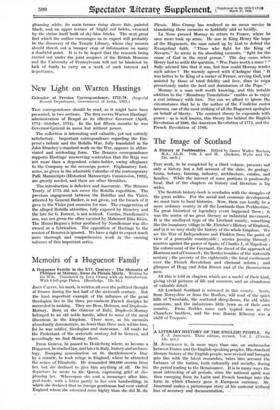Memoirs of a Huguenot Family
A Huguenot Family in the XVI. Century : The Memoirs of Philippe de Mornay, Sieur du Plessis Manly. Written by his Wife. Translated by Lucy Crump with an Introduction. With 8 full-page Plates. (Routledge. 12s. 6d.)
JOHN CALVIN, his mark, is written all over the political thought of France during the last half of the sixteenth century. Not the least important example of the influence of the great
theologian lies in the three pre-eminent French disciples he Succeeded in making. They are Beza, Hotman, and Duplessis- Mornay. Born at the chateau of Buhi, Duplessis-Mornay belonged to an old noble family, allied to some of the most
illustrious in the, kingdom. There were, as his memoirs abundantly demonstrate, no fewer than three men within him, for he was soldier, theologian and statesman. All roads for the Protestant of the sixteenth century led to Geneva', and accordingly we "find_ Mornay there.
From Geneva, he passed to Heidelberg where, as became a
Huguenot, he studied law, and later in Italy, history and archaeo- logy. Escaping assassination on St. Bartholomew's Day by a miracle, he took refuge in England, where-he attracted
the notice of Elizabeth. He demanded 300,000 crowns from her, but she declined to give him anything at all. On his
departure he wrote to the Queen, expressing grief at dis-r pleasing her. Whereupon she sent a -messenger after him, post-haste, with a letter partly in her own handwriting, in; which she declared that no foreign gentleman had ever visited Ungland whom she esteemed more highly than she did M. du
Plessis. Miss Crump has rendered us no mean service in translating these memoirs so- filthfully and so lucidly.
La Noue pressed Mornay to return to France, where he once more took up arms. He saw in King Henry the hope of the Huguenots, the man raised up by God to defend the Evangelical faith. " Those who fight for the King of Navarre," he wrote in his absorbing memoirs, "fight for the cause of God in the royal person." The day came when Henry had to settle the questiOn, " Was Paris worth a mass ?
Sully advised him that it was, but how could Mornay tender such advice Y He warmly agreed with d'Aubigne that " It was better to be King of a corner of France, serving God, and assisted by those of tried fidelity and love, than to reign precariously under the heel and domination of the Pope."
Mornay is a man well worth knowing, and this notable addition to the "Broadway Translations" enables us to enjoy a real intimacy with him. Nor can we afford to ignore the circumstance that he is the author of the Vindiciae contra tyrannos, one of the most striking of all the Huguenot apologias on behalf of liberty. The contract theory he expounds with power : as is well known, this theory lies behind the English Revolution Of 1688, the American Revolution of 1775, and the French Revolution of 1789.






















































 Previous page
Previous page